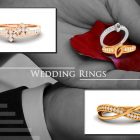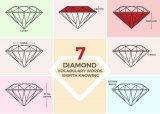
In my last two blogs about the 4C’s of Diamonds, I talked about how diamonds are graded based on their “Color” and “Clarity”. In this blog, I will be going over the third “C” of the diamond, The Cut. Both the Color and Clarity of a diamond are controlled by Mother Nature, but men have full control over how to cut a diamond.
A rough diamond goes through a series of planning and preparation stages prior to being cut and polished. Determining the shape or the Cut of a diamond depends on many factors. Some diamond cutters may choose to retain maximum weight and cut a diamond based on the geometric shape of a natural rough diamond. Some may desire a number of smaller diamonds with high clarity diamonds instead of a single big diamond containing many dark impurities inside. However, most diamond cutters choose a Diamond Cut that would balance both the weight retention and clarity characteristic and most importantly yield highest value.
The Cut of a diamond describes two features of a polished diamond. The first one refers to its outer shape and cutting parameters used to cut the diamond. And the second one refers to how smoothly and symmetrically the outer surface of the diamond is polished. Both the features are equally important to bring the rough diamond to life and to yield a polished diamond with highest brilliance, fire and scintillation.
Interesting Trivia: While there exist 10 different major shapes into which diamonds are cut and polished, the number of diamonds cut into round brilliant shape is more than double of all the other shapes put together. Nearly 75% of all diamonds produced are Round Brilliant cuts.
Diamonds can be cut into infinite number of shapes and sizes. Here is a brief list of ten of the most popular diamond cuts.
1. Round Brilliant Cut: The most widely sold and demanded shape, the Round Brilliant cut is also one of the oldest known cuts. It is the only shape that is considered as a standard shape for diamonds – all other cuts are commonly described as “fancy” cuts. Typically, big round brilliant cut diamonds are considered ideal for solitaire rings.

2. Princess Cut: The runners up in popularity category after Round Brilliant, the Princess cut is as square shaped cut. It creates an extremely beautiful array of light performance whether it’s set in rings, earrings or necklaces. A perfectly crafted Princess Cut diamond is bound to make heads turn.

3. Oval Cut: A modified form of the Round Brilliant cut, the oval cut almost matches it’s more in-demand sibling in terms of showing off the best features of the diamond. Additionally, most Oval cut diamonds, even if of the same carat weight, would seem larger than Round Brilliant cut stones.

4. Marquise Cut: Yet another modification on the Round Brilliant cut, the Marquise cut is shaped like the ball used to play American Football. If diamonds of the same carat weight in different shapes are compared, Marquise cut diamonds would measure the highest in surface area. Those who like big diamonds in their jewelry would definitely enjoy this particular cut.

5. Pear Cut: “Tear Drop” is another name for this cut, as it closely resembles a falling tear drop. It was created by bringing the Round Brilliant and Marquise cuts together. This shape also has the distinction of being host to the largest known cut and polished diamond in the world – the

6. Cushion Cut: This two centuries old cut was perhaps the most popular and in demand cut before the Round Brilliant Cut caught the fancy of admirers. It is also a square cut just like the Princess cut, but with rounded edges. Some of the best known diamonds in history –

7. Emerald Cut: Steps on the pavilion coupled with an extra-large table defines the rectangular Emerald cut. Unlike most other cuts, the Emerald cut is not designed to highlight the inner fire of the stone. Rather, it focuses on producing a series-of-mirror effect, which makes the diamond look like a chamber stretching to infinity on the inside.

8. Asscher Cut: Created by two of the most gifted diamond craftsmen of all time from Holland – the Asscher Brothers – has been named after them. The Asscher cut is the precursor to the Emerald cut in that it is a square shaped, step sided cut with a smaller table and a higher crown.

9. Radiant Cut: A crossover between the Princess and the Cushion cuts, the Radiant cut is a special one with its facets aligned similar to the brilliant cut. This unique combination gives the Radiant Cut diamond its excellent fire and sparkle.

10. Heart Cut: The most romantic of all the diamond cuts, the Heart cut is naturally the preferred cut for lovers. It finds maximum use in solitaire rings and pendants. The Heart Cut is one of the most difficult cuts due to meticulous attention to detail required to cut and polish its cleft. It is also slightly more expensive compared to the rest of the fancy cuts with similar carat weight due to significant weight loss during the cutting and polishing process.

Hard Fact: The level of planning, working and re-working required to achieve a perfect cut is so complicated that often, it takes years to fully and satisfactorily process a large diamond. For example, it took almost four and half years for the
![]()








